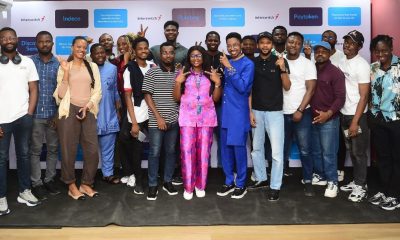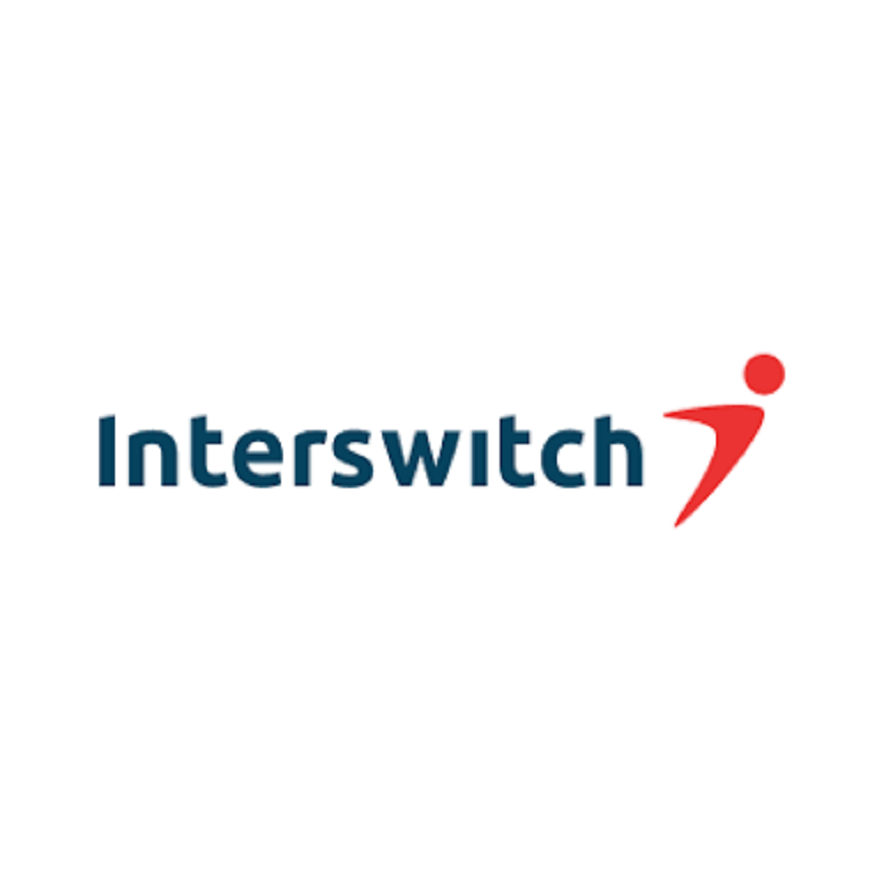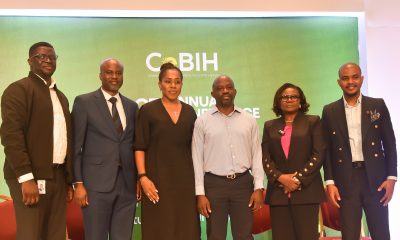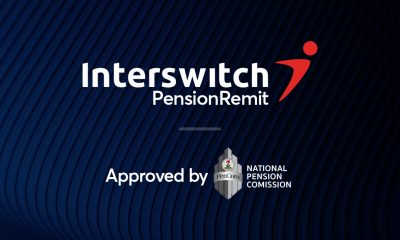Auto
Interswitch Unveils Three Transport Ticketing Products
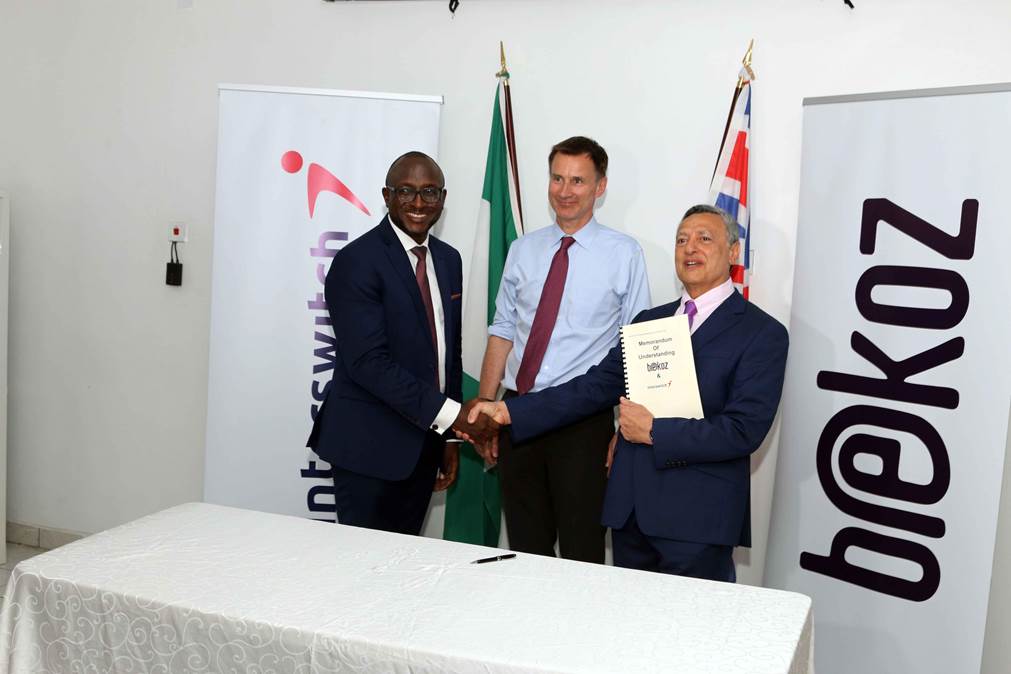
By Dipo Olowookere
As part of its determination to bring succour to motorists in the country, Interswitch Group, the Nigeria Pan-African integrated digital payments company, has launched three transport ticketing products developed exclusively for the Nigerian market.
The three new products are the BeCard, the BeVal and the BeReader, but the company said it could expand this offer throughout Africa.
It was gathered that these products were developed as part of the multi-billion Naira deal signed with Bekoz UK Ltd, a British transport ticketing company, to enhance transportation ticketing in Nigeria.
The deal, which is worth £56 million (approx. N26 billion), will leverage British technology to keep Nigeria’s commuters on the move.
The BeCard is a regular shaped card – like any bank card or the Oyster card in London. The BeVal is the device that is installed on the buses where the passenger taps on – just like on the London buses, while BeReader is the mechanism that makes all these work.
Commenting on the partnership, Mr Akeem Lawal, Divisional CEO for Payment Processing at Interswitch highlighted the tremendous potential the partnership offers for revolutionizing the transportation system with attendant impact on millions of commuters in Nigeria.
He said: “Interswitch believes that the transport system in Nigeria, Africa’s largest consumer market, is ready for innovation. This partnership is a key and timely milestone in our industry vertical markets’ focus. It is highly compatible with our vision for Interswitch Transport Solutions (Smartmove) which is essentially to progressively facilitate a multi-modal and multi-operator transportation system underpinned by best-in-class technology”.
“This not only optimizes available infrastructural capacity, but also remarkably improves user experience for all parties in the transport and mobility ecosystem. Our partners, Bekoz, bring their expertise and experience to bear, and we are extremely optimistic about the multiplier effects that this initiative will ultimately have on economic activities across the nation,” he added.
Bekoz has co-created the technology with Interswitch and owns the intellectual property (IP) while the specifications and manufacturing is done by Delta Microelectronics, a global engineering company with a long and proud history of demonstrated excellence.
Speaking in Abuja, at the signing ceremony, Mr Jeremy Hunt, the British Foreign Secretary announced that Bekoz will be providing the contactless transit token technology and associated electronic equipment that allows people to travel around Nigeria’s large and varied transport infrastructure, similar to London’s Oyster system. However this will be tailored to Nigeria’s unique needs.
Mr Hunt said: “This is a great example of British and Nigerian companies working side by side to deliver a better, more prosperous future for us all.
“Africa’s success really matters to the UK, and this deal proves that we have a huge amount of expertise that we can share to contribute to that success. As we leave the European Union, now is the time to redouble our efforts, and commit to the partnerships we have with our African friends.”
Also commenting, Mr Jack Dangoor, CEO of Bekoz said: “We are delighted to collaborate with Interswitch to deliver a British-made fully custom transport ticketing system for Nigeria and other parts of Africa. Our technology offers an efficient and cost-effective solution for commuters and transport operators that satisfies local needs and utilizes the existing infrastructure provided by Interswitch. The ecosystem of the Bekoz solution will provide significant retail business and job opportunities in Nigeria and beyond.”
In the UK, topping up an Oyster card is quite easy. However, factors like limited network connectivity and little or no electricity might make topping the BeCard in Nigeria more difficult. That is why the BeReader is solar powered and does not require network connection all the time. It is a low-cost device and can transform anyone into an entrepreneur as every BeReader creates a business opportunity for the operator.
Much of the manufacturing will be done in UK, and the deal is expected to create jobs in the Nigerian business and transportation environment.
Auto
inDrive Ranks Second in Ride-Hailing App Downloads Globally
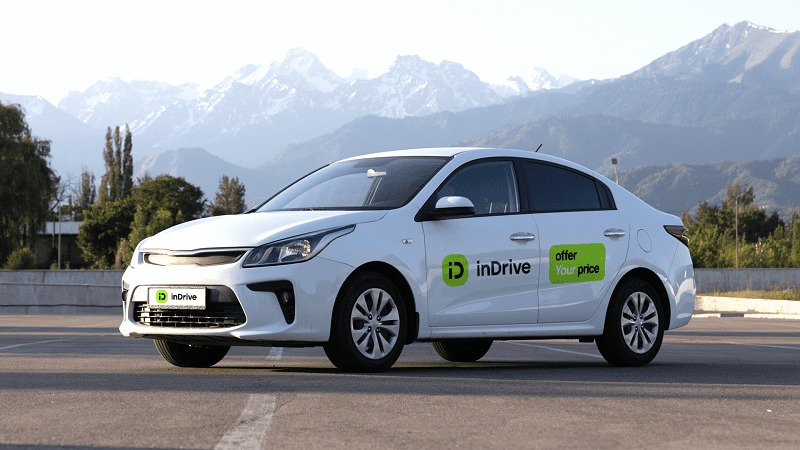
By Modupe Gbadeyanka
A global mobility and urban services platform, inDrive, for the fourth consecutive year, has emerged as second in ride-hailing app downloads in the world.
In its latest report, a leading market intelligence firm, Sensor Tower, also disclosed that the company ranked fourth globally in the travel category for downloads, up from fifth place in 2024, reflecting growing engagement as it continues its transition into a super app.
It was also revealed that inDrive was ranked number one in the travel category by downloads in nine countries, with newcomers to the list including Peru and Pakistan, and placed among the top three most downloaded travel apps in 22 countries.
The chief executive of inDrive, Mr Arsen Tomsky, while commenting on these feats and others, said the continued rise underscores a broader shift toward multi-service platforms that deliver everyday value while remaining closely aligned with local market needs and user expectations.
“Maintaining our position as the world’s second most downloaded ride-hailing app for a fourth consecutive year is a powerful validation of the value inDrive delivers to its users every day.
“This recognition reflects the trust people place in our platform and the continued dedication of our global team.
“As inDrive evolves into a super app, we remain focused on our core principles of fairness, transparency, and user choice, while expanding access to services that make a meaningful difference in people’s daily lives,” Mr Tomsky said.
The latest report highlights that super app ecosystems are becoming a key growth driver for the ride-hailing industry, particularly in emerging markets where users are engaging more frequently and across a broader range of use cases.
The inDrive app – defined by its peer-to-peer pricing model that allows drivers and riders to agree on a fair price mutually – has now been downloaded over 400 million times since its launch. Available in 1,065 cities worldwide, it has facilitated more than 8 billion transactions.
The platform operates across 48 countries, driven by strong global adoption, including growing momentum across Africa and continued growth in Nigeria.
In 2025, inDrive accelerated its transition into a super app, expanding beyond its core ride-hailing offering to offer additional services, including intercity transportation, courier, grocery delivery, and financial services.
By expanding its offering and meeting more of its users’ daily needs, inDrive is driving deeper and more frequent user engagement – an approach that underpins its continued global momentum.
Technology under the hood, including AI and advanced analytics, plays a significant role in supporting this evolution by enabling greater personalization and more seamless user experiences.
From using machine learning to fix mapping gaps and deliver more accurate ETAs, to predictive analytics that anticipate user needs and personalize service offerings, these capabilities drive innovation. In contrast, ensuring users retain complete control over pricing decisions is consistent with inDrive’s commitment to fairness through choice.
Auto
GoCab Receive $45m to Scale Ethical Mobility Financing Platform
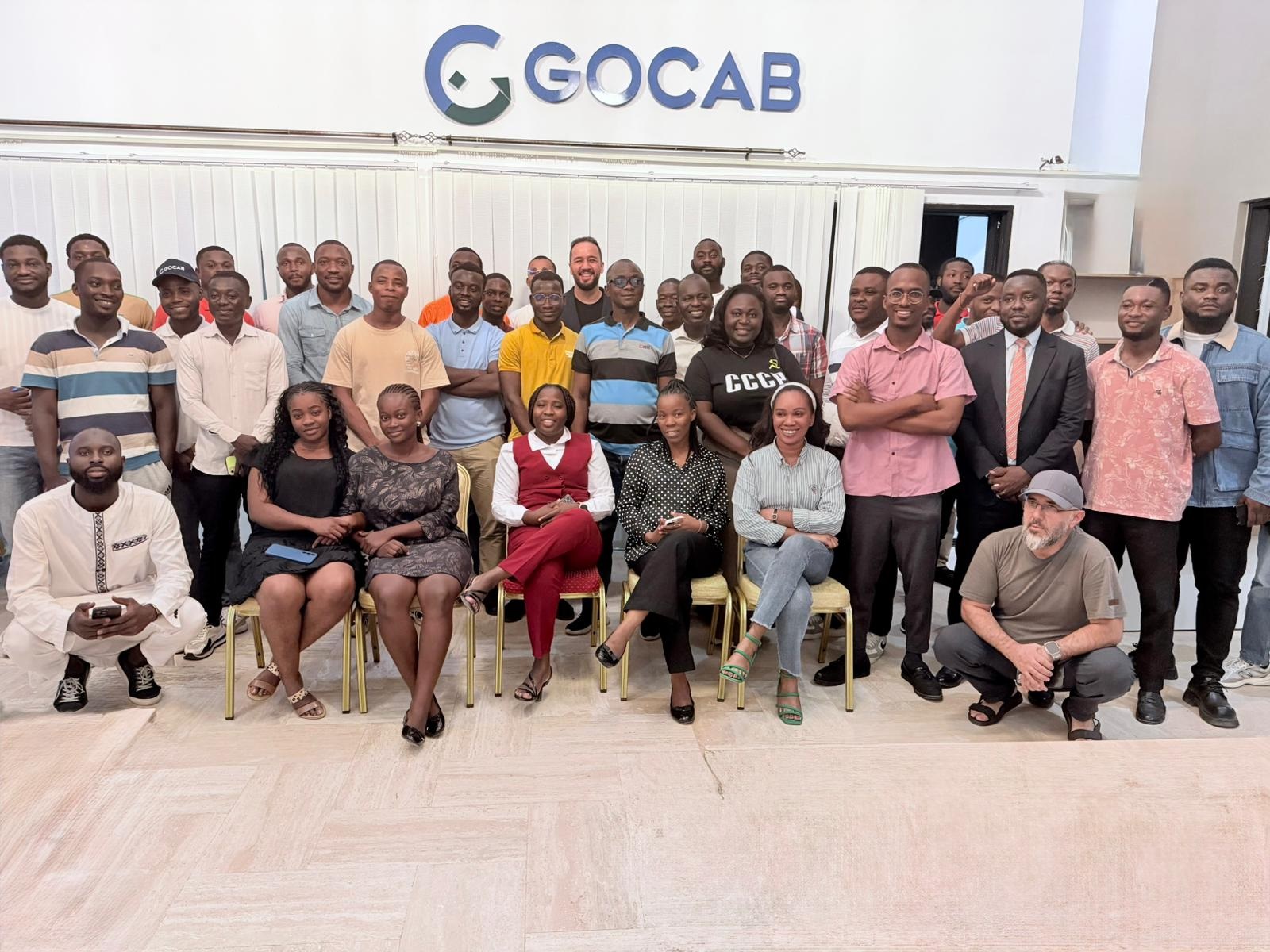
By Dipo Olowookere
A funding package of up to $45 million has been secured by a mobility fintech firm, GoCab, to scale its ethical mobility financing platform across emerging markets.
A statement made available to Business Post disclosed that the funds comprise $15 million equity and $30 million debt, with the equity round co-led by E3 Capital and Janngo Capital. Others involved in the transactions were KawiSafi Ventures and Cur8 Capital.
GoCab operates a drive-to-own mobility fintech model that provides credit to gig-economy workers to buy their own car, bike and others in emerging markets.
It offers vehicles in drive-to-own programmes, mobile phone BNPL, motorbike financing for delivery couriers, and other value-added services through a single digital platform powered by proprietary technology.
With this financing support, GoCab plans to expand its operations and fleet, aiming for 10,000 active vehicles and $100 million in annual recurring revenue within the next 24 months.
Across five markets, GoCab now generates over $17 million in Annual Recurring Revenue (ARR) after just 18 months of operations and is on target to reach $50 million by end of 2026 and $100 million in 2027.
The company was established in 2024 by Mr Azamat Sultan and Mr Hendrick Ketchemen to address the limited access to ethical financing and vehicle ownership for gig-economy workers in Africa.
By combining mobility, technology, and inclusive finance, the organization enables drivers and delivery couriers to generate stable income while progressively gaining ownership of their vehicles.
By 2025, GoCab had taken a leading position in several African markets, supporting thousands of drivers and contributing to cleaner, more sustainable urban mobility systems.
“Transforming lives and improving the daily reality of thousands of families is the mission we have set for ourselves. We believe that capital can and must become a powerful force for transformation across Africa and emerging markets,” Mr Ketchemen said.
His counterpart, Mr Sultan, disclosed that, “For us, GoCab is about restoring dignity and opportunity through ownership.
“Across Africa, millions of people are locked out of both mobility and finance. We saw how capital was flowing everywhere except to the people who actually needed it to work.
“This round allows us to scale responsibly expanding access to fair, ethical financing while accelerating the transition to electric mobility, lowering carbon emissions, and building a more inclusive and sustainable future in close alignment with our investors.”
One of the investors, Mr Vladimir Dugin of E3 Capital, said, “The shortage of vehicles and the high cost of transportation remain two of the most pressing challenges across Africa. GoCab is addressing both head-on through a data- and technology-driven platform that expands access to mobility while improving efficiency at scale.
“Its rapidly growing EV fleet lowers costs for riders and drivers alike, while significantly reducing emissions. We are proud to support GoCab as it builds the leading pan-African mobility platform for the future.”
“We are proud to lead GoCab’s $15 million equity round, catalysing over $30 million in debt financing. We were impressed by their vision, their world-class team, and the quality of their execution.
“With this funding, GoCab now has the scale to deploy thousands of productive vehicles, each supporting a full-time income.
“With a clear operational roadmap toward 10,000 active assets and $100 million in recurring revenue, GoCab illustrates how ethical financing can translate into tens of thousands of decent jobs, household resilience, and sustainable growth at scale,” the chairman of Janngo Capital, Fatoumata Bâ, stated.
Also, a partner at KawiSafi Ventures, Mr Marcus Watson, said, “GoCab is building critical infrastructure for climate-smart mobility and the future of work in emerging markets. The combination of disciplined execution, strong unit economics, and a clear impact thesis makes GoCab a compelling platform for sustainable growth.”
Auto
Demolitions: inDrive Shares N75m Relief Packages to Displaced Lagos Residents
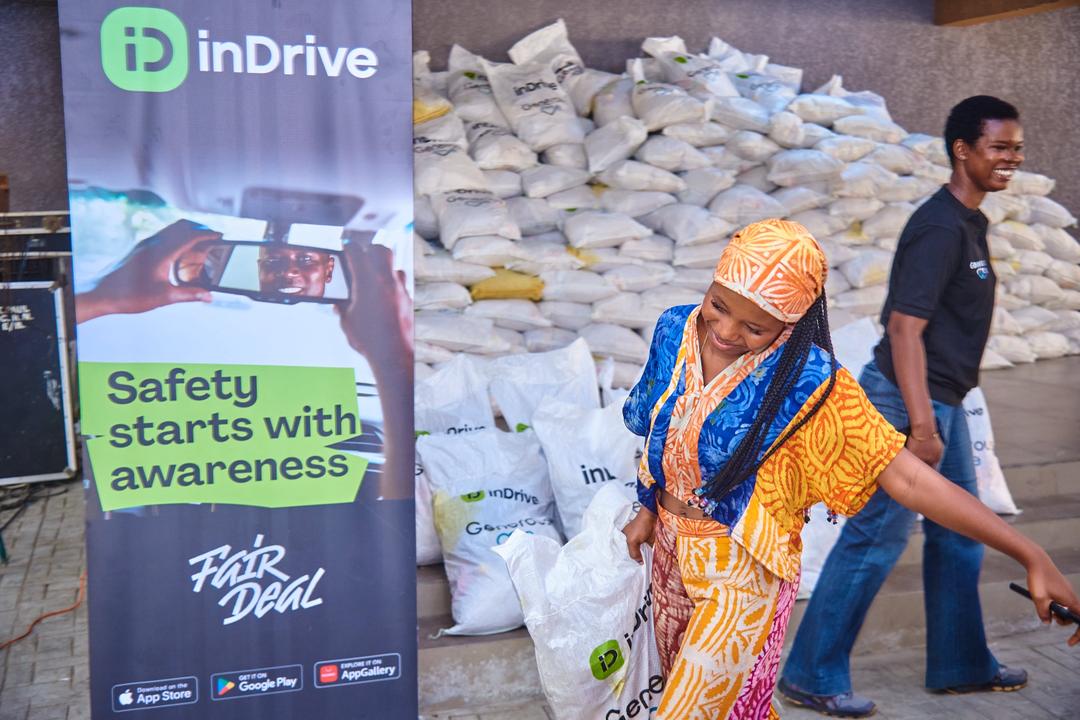
By Modupe Gbadeyanka
Over N75 million worth of relief materials have been provided by foremost ride-hailing platform, inDrive, to residents of Lagos State displaced by recent demolitions in the metropolis.
The company partnered with Tolu Aniwura Welfare Foundation (GenerousMe) to distribute essential food, clothing, and school supplies to more than 2,000 affected individuals and families.
At the distribution of the items at St. Paul Catholic Church, Ebute-Metta, the Country Representative for inDrive Nigeria, Mr Timothy Oladimeji, explained that the initiative reflects the company’s people-first approach and its commitment to responding directly to urgent community challenges while maintaining a focus on long-term empowerment across its markets.
“At inDrive, we believe that our responsibility goes beyond providing mobility services; it extends to standing with communities during moments of need.
“The recent demolitions left many families vulnerable, and through our partnership with GenerousMe, we were able to respond quickly and responsibly. This intervention reflects our commitment to fairness, empathy, and ensuring that people remain at the centre of everything we do,” Mr Oladimeji said.
It was gathered that the support also extended to individuals who had previously benefited from inDrive-backed social impact programmes, reflecting the company’s continued commitment to empowering vulnerable communities across Nigeria.
The relief packages included essential dry food items such as rice, beans, garri, noodles, spaghetti, cooking oil, tomato paste, seasoning cubes, and salt. Beneficiaries also received clothing, blankets, sleeping mats, mosquito nets, rechargeable lamps, power banks, and baby care items, as well as school packs containing bags, exercise books, and writing materials for children.
In his remarks, the Partnerships Lead for GenerousMe, Mr Adetola Alade, said, “Partnering with inDrive enabled the timely and coordinated delivery of aid. We prioritize speed and collaboration in responding to urgent humanitarian needs, and working with inDrive on this project was a great experience.”
-

 Feature/OPED6 years ago
Feature/OPED6 years agoDavos was Different this year
-
Travel/Tourism9 years ago
Lagos Seals Western Lodge Hotel In Ikorodu
-

 Showbiz3 years ago
Showbiz3 years agoEstranged Lover Releases Videos of Empress Njamah Bathing
-

 Banking8 years ago
Banking8 years agoSort Codes of GTBank Branches in Nigeria
-

 Economy3 years ago
Economy3 years agoSubsidy Removal: CNG at N130 Per Litre Cheaper Than Petrol—IPMAN
-

 Banking3 years ago
Banking3 years agoSort Codes of UBA Branches in Nigeria
-

 Banking3 years ago
Banking3 years agoFirst Bank Announces Planned Downtime
-

 Sports3 years ago
Sports3 years agoHighest Paid Nigerian Footballer – How Much Do Nigerian Footballers Earn


